CIVIL SOCIETY WATCH 16-20 MAY
This week – online rally against continuation of Energy Charter Treaty, World Bee Day and talks on xenophobia
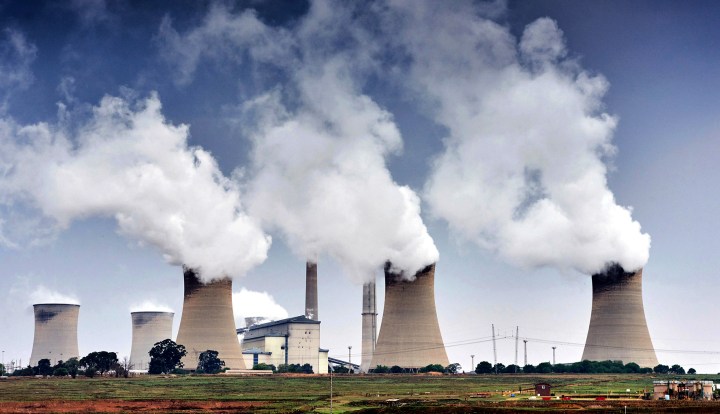
A two-day conference on collective action for beneficial ownership transparency is taking place at the Cape Sun Hotel in Cape Town; Black Sash is launching its report on the Covid-19 Social Relief of Distress Grant; and the Konrad Adenauer Foundation is hosting an online discussion on how society can respond to the gap left by a retreating state.
Monday, 16 May is International Day of Living Together in Peace. The observance is intended to encourage countries to further promote reconciliation, thus ensuring peace and sustainable development, according to the United Nations information page on the event.
The promotion of reconciliation should involve working together with communities, faith leaders and other relevant actors, it says.
“Living together in peace is all about accepting differences and having the ability to listen to, recognise, respect and appreciate others, as well as living in a peaceful and united way.
“The day aims to uphold the desire to live and act together, united in differences and diversity, in order to build a sustainable world of peace, solidarity and harmony.”
Monday is also International Day of Light. Light plays a central role in the lives of humans, according to the UN Educational, Scientific and Cultural Organisation (Unesco). At a fundamental level, through photosynthesis, light is the origin of life.
“The International Day of Light celebrates the role light plays in science, culture and art, education and sustainable development, and in fields as diverse as medicine, communications, and energy,” according to Unesco.
“The celebration will allow many different sectors of society worldwide to participate in activities that demonstrate how science, technology, art and culture can help achieve the goals of Unesco – building the foundation for peaceful societies.”
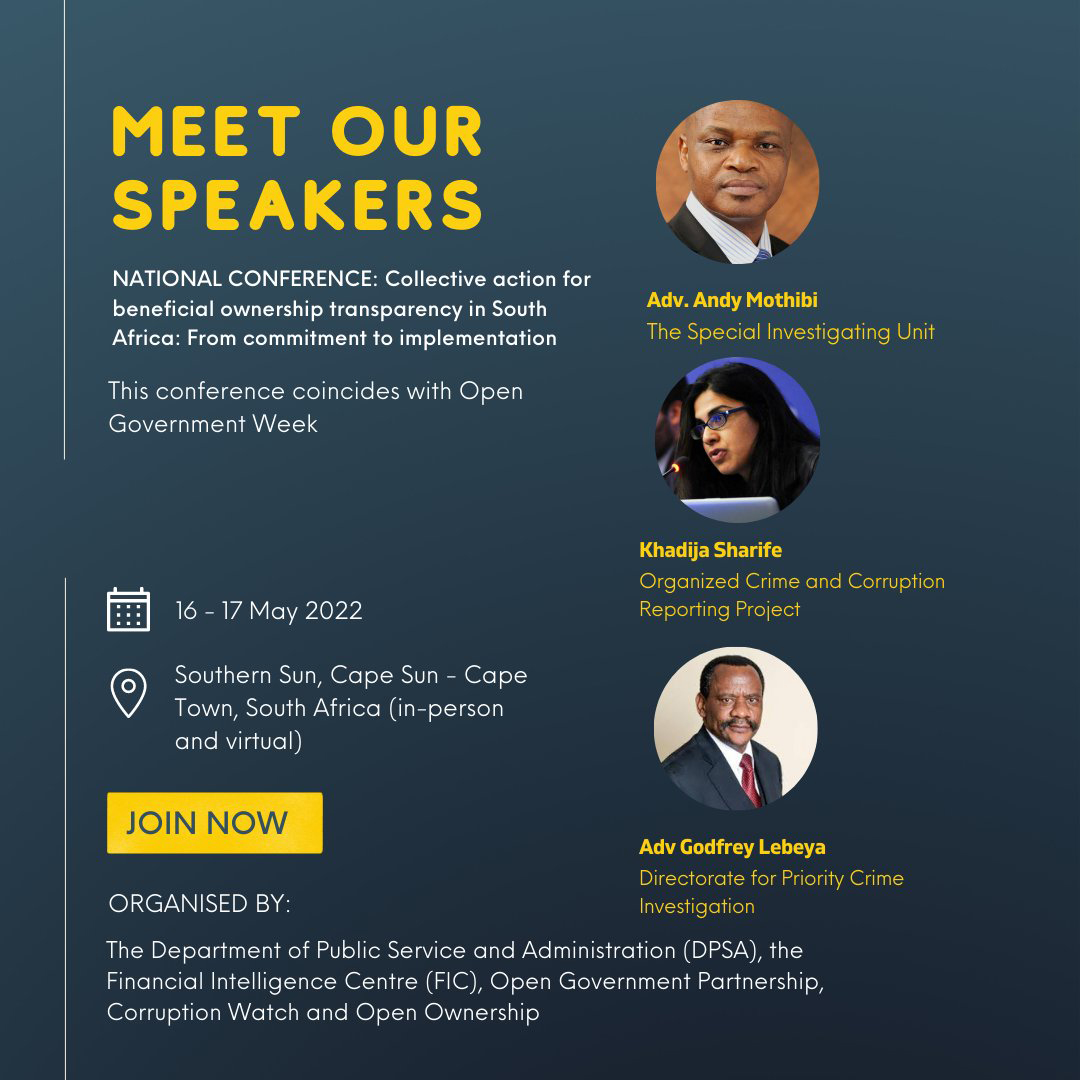
Poster 1
On Monday, 16 May at 9am a two-day conference on “Collective action for beneficial ownership transparency (BOT) in South Africa: From commitment to implementation” will begin at the Cape Sun Hotel in Cape Town.
Issues to be explored include:
- The recent progress of the various initiatives under way through the Interdepartmental Committee BOT;
- International and regional best practice in implementing BOT; and
- The collaborative role of the government, civil society and the private sector in actioning South Africa’s BOT commitments.
“Beneficial ownership transparency (BOT) has become one of the leading topics in the international agenda for financial reform. It is widely seen as a critical tool in fighting illicit financial flows related to corruption, money laundering and tax evasion,” says the event description.
“This national conference coincides with global Open Government Week and will contribute to a multistakeholder BOT roadmap for South Africa.”
The event was co-organised by the Department of Public Service and Administration, the Financial Intelligence Centre (FIC), the Open Government Partnership, Corruption Watch and Open Ownership.
Register for virtual attendance here.
On Monday at 4pm the Wits Institute for Social and Economic Research will host an online seminar on a paper, “Grass in the cracks”: Gender, social reproduction and climate justice in the Xolobeni struggle, by Shireen Hassim and Beth Goldblatt.
The struggle of the Xolobeni people against proposed mining on their communally occupied land points to important links between efforts to overcome gendered structures of production and reproduction and environmental destruction. This offers insights for feminist struggles for climate justice, according to the event description.
Those who wish to attend the seminar should first read the paper here.
Register here.
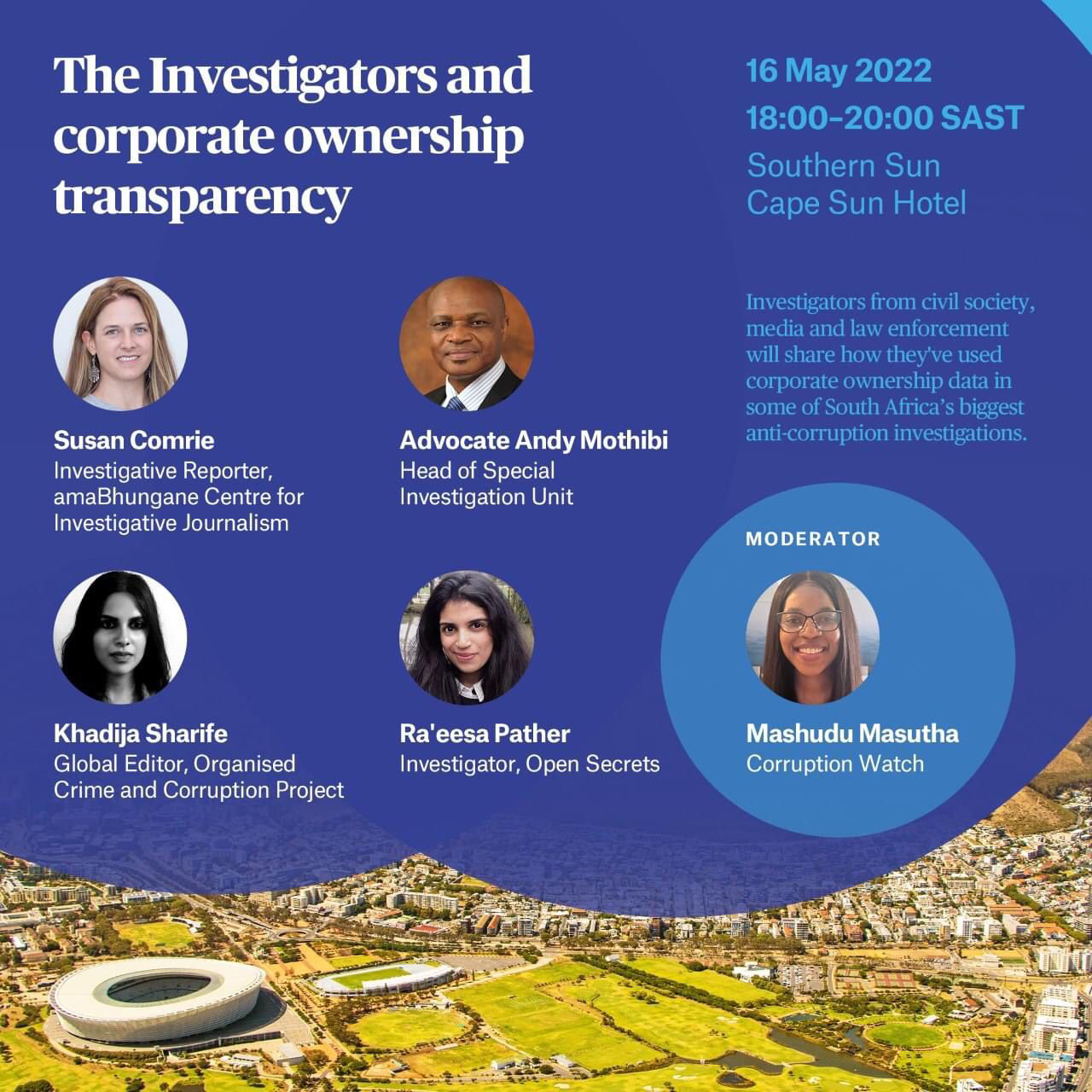
Poster 2
At 6pm on Monday investigators from civil society, media and law enforcement will share how they’ve used corporate ownership data in some of South Africa’s biggest anti-corruption investigations. The discussion forms part of the BOT conference at the Cape Sun Hotel, and is titled, “The investigators and corporate ownership transparency”. Mashudu Masutha of Corruption Watch is the moderator.
Speakers include Susan Comrie, investigative reporter at the amaBhungane Centre for Investigative Journalism; Advocate Andy Mothibi, head of the Special Investigating Unit; Khadija Sharife, global editor for the Organised Crime and Corruption Reporting Project; and Ra’eesa Pather, investigator for Open Secrets.
Tuesday, 17 May is World Telecommunication and Information Society Day. This year, the aim is to raise awareness of the important role of telecommunications in supporting people to stay healthy, connected and independent.
Telecommunications and information communication technologies can ensure healthier ageing, the building of smarter cities, the combating of age-based discrimination in the workplace and the financial inclusion of older persons, according to the UN.
“Supporting a life of healthy ageing is also critical for the sustainability of economic and health systems. The International Telecommunication Union hopes to foster initiatives to accelerate digital technologies for older persons and healthy ageing that will contribute towards the UN Decade of Healthy Ageing,” it adds.

On Tuesday at 10am there will be a virtual launch of Black Sash’s report, It’s Helping Even Though It’s Not Enough: The Covid-19 Social Relief of Distress Grant, Basic Income Support, and Social Protection in South Africa. This qualitative, case study-based report is the culmination of an analysis of the policy framework, the regulations and delivery systems that have framed the establishment of the grant, says the event description. It draws from interviews with grant applicants to “assess the impact of application processes, particularly for women and young people”.
“The effectiveness of the [Covid-19 Social Relief of Distress] Grant in alleviating hunger and extreme poverty has reignited calls by Black Sash among others for the state to consider a permanent system of Basic Income Support for those aged between 18 and 59, with little or no income, who were previously excluded from the social assistance system,” it continues.
Speakers at the event include Thandiwe Matthews of Wits University, Candice Groeneweld of the Human Sciences Research Council, and Benita Moolman of the University of Cape Town.
Register here.
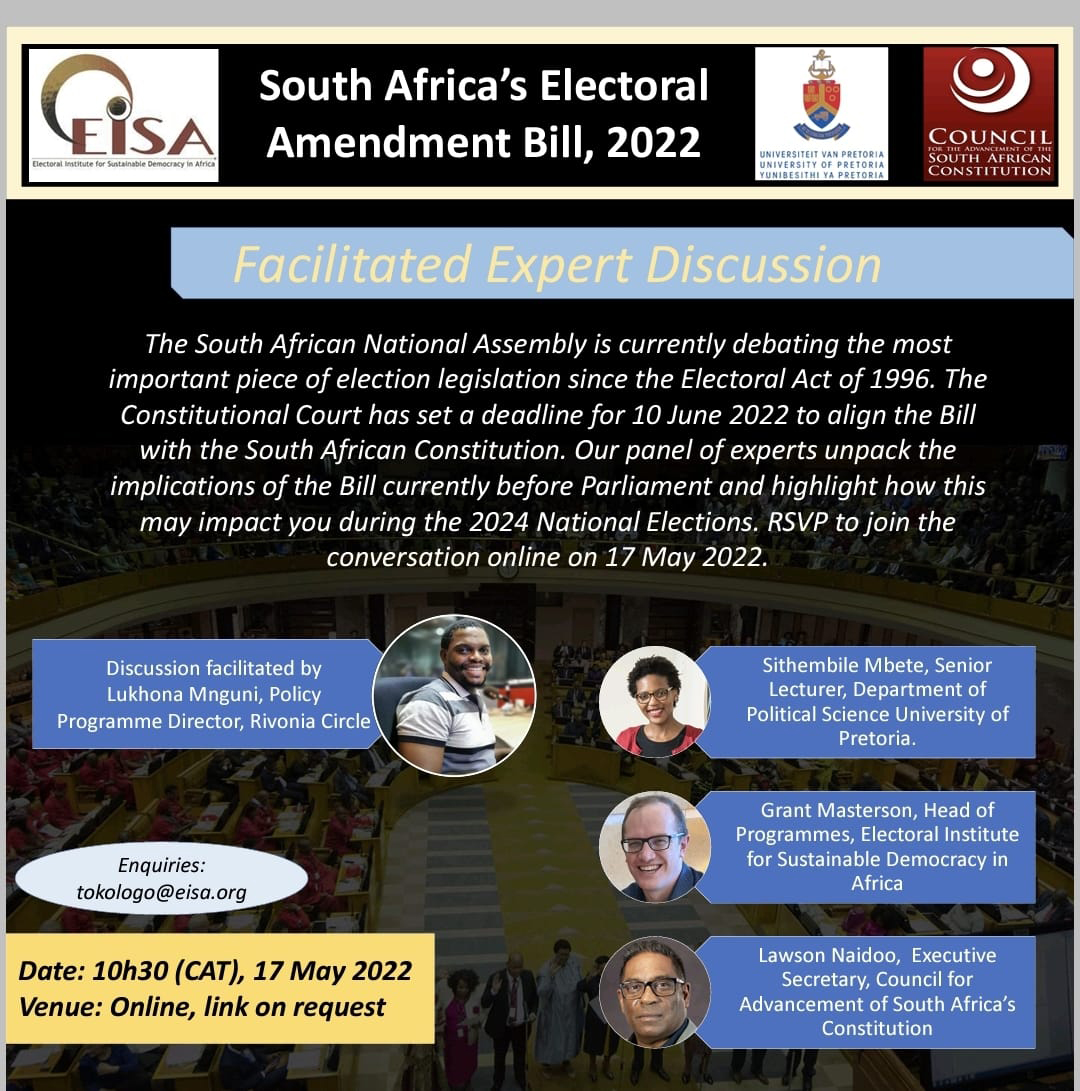
On Tuesday at 10.30am the Electoral Institute for Sustainable Democracy in Africa, the University of Pretoria and the Council for the Advancement of the South African Constitution will host a discussion on South Africa’s Electoral Amendment Bill 2022.
“The South African National Assembly is currently debating the most important piece of election legislation since the Electoral Act of 1996,” according to the event poster. “The Constitutional Court has set a deadline for 10 June 2022 to align the bill with the South African Constitution.”
The discussion will unpack the implications of the bill before Parliament, while highlighting how this may affect South Africans during the 2024 national elections.
Speakers include Sithembile Mbete, senior lecturer in the Department of Political Science at Pretoria University; Grant Masterson, head of programmes for the Electoral Institute for Sustainable Democracy in Africa; and Lawson Naidoo, executive secretary of the Council for the Advancement of the South African Constitution.
For further enquiries contact [email protected].
On Tuesday at 3pm a webinar on “Building open and transparent land information systems through a global alliance” will be co-hosted by the Land Portal, the Global Data Barometer and the Open Data Charter.
The webinar will involve the presentation of the land module in the Global Data Barometer and Land Portal Foundation’s State of Land Information approach, according to the event description.
“Over the last three years the Land Portal Foundation has collaborated with Global Data Barometer and Open Data Charter to embed land issues within key open data activities,” it says.
“These partnerships aim to deliver tools needed to understand and strengthen national land information ecosystems, and ultimately enable a more open state wherein accessible information and responsible re-use of data can create positive change.”
Register here.
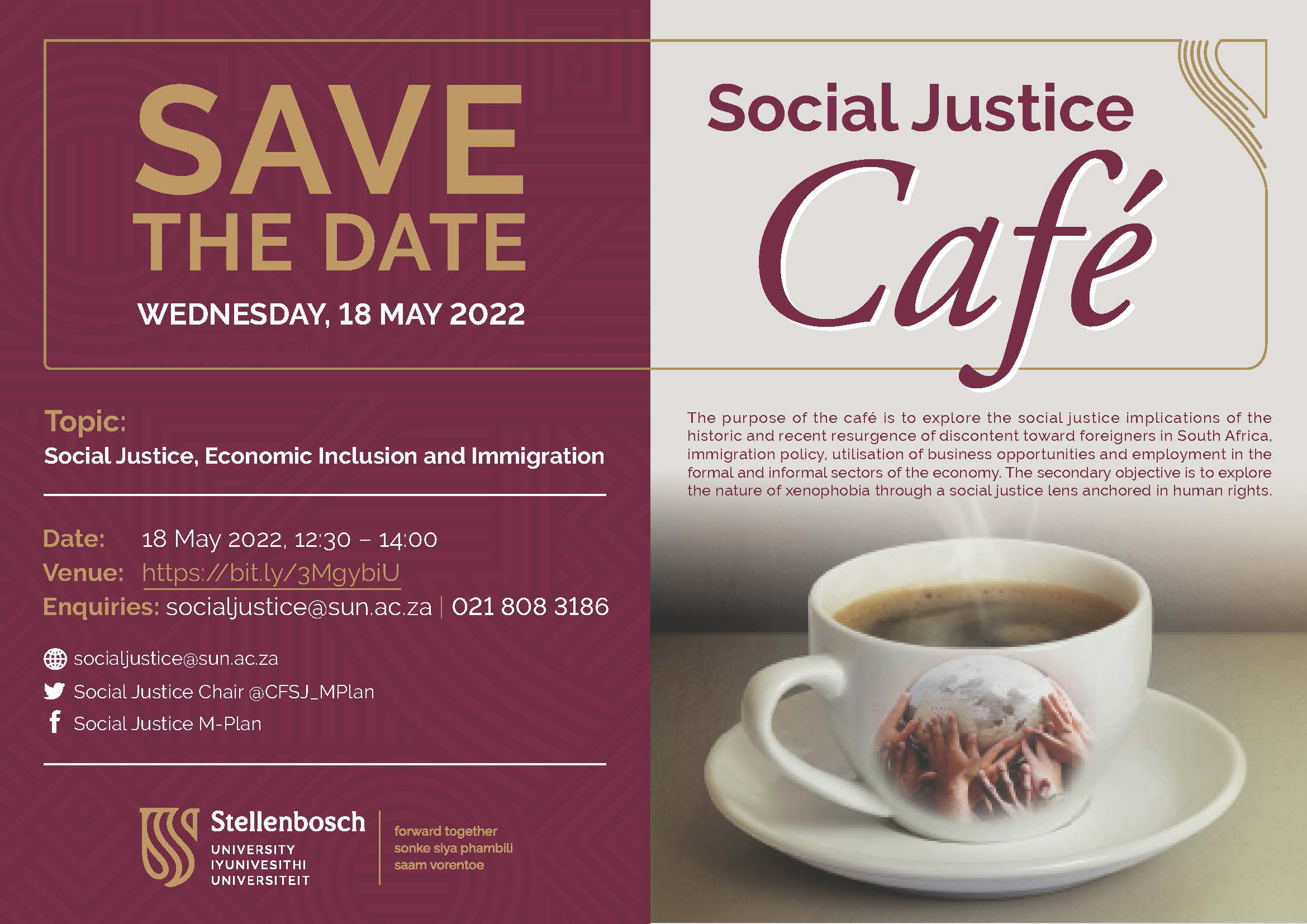
On Wednesday, 18 May at 12.30pm the Law Trust Chair in Social Justice at Stellenbosch University will hold a Social Justice Café on “Social Justice, Economic Inclusion and Immigration”.
The purpose is to “explore the social justice implications of the historic and recent resurgence of discontent toward foreigners in South Africa”. A secondary objective is to explore the nature of xenophobia through a social justice lens anchored in human rights.
For further enquiries contact [email protected] or 021 808 3186.
Join the discussion here.
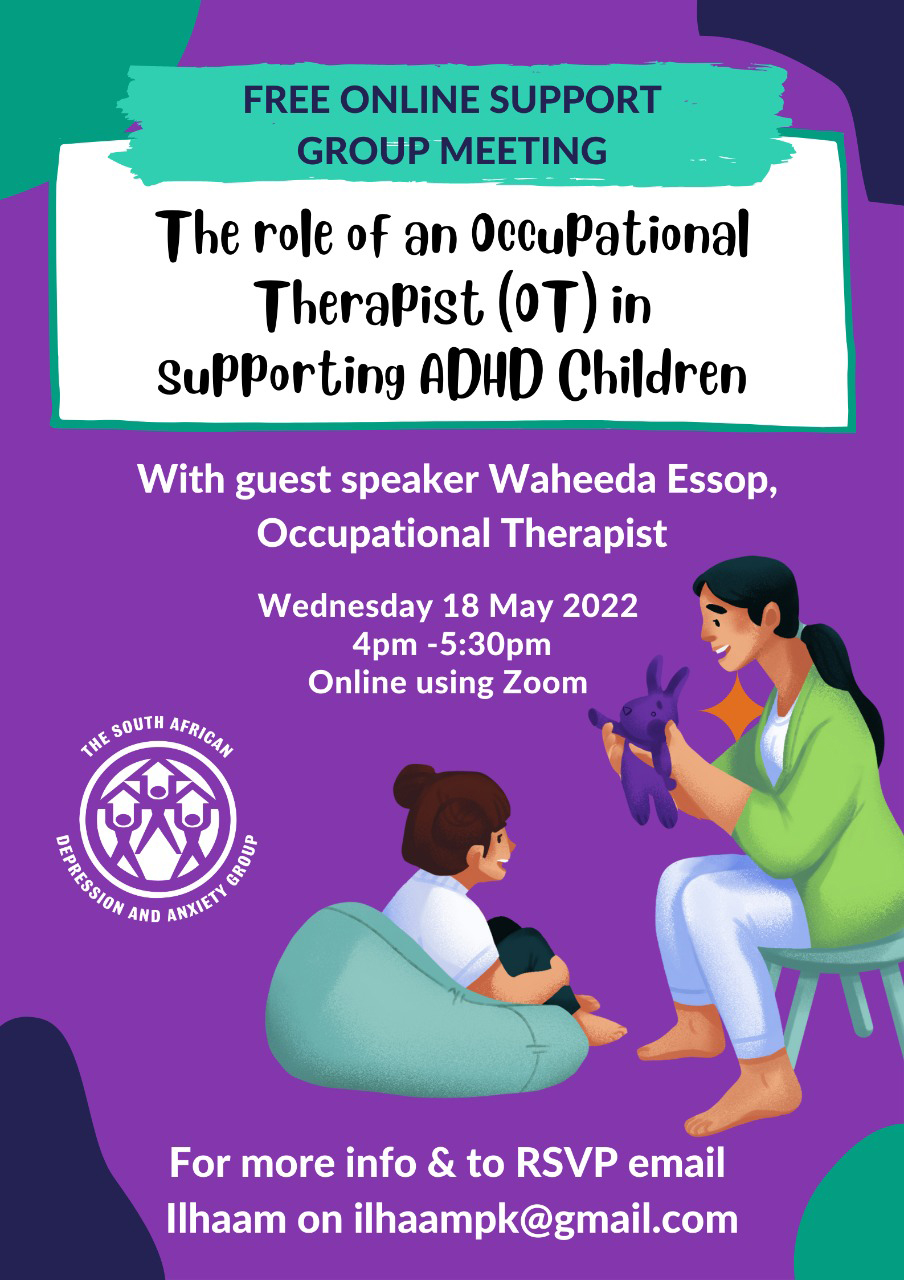
On Wednesday at 4pm the South African Depression and Anxiety Group (Sadag) will host a free online support group on “The role of an occupational therapist (OT) in supporting ADHD children”. The guest speaker is Waheeda Essop, an occupational therapist.
For more information contact Ilhaam at [email protected].
On Wednesday at 8pm War on Want will hold an online rally against the continuation of the Energy Charter Treaty. It is titled “Climate Goals held to Ransom: Exit the Energy Charter Treaty!”
“Corporations are holding our planet’s future to ransom and the Energy Charter Treaty (ECT) is the fossil fuel industry’s secret weapon,” says the event description.
“It allows corporations to sue countries for billions, through a mechanism called investor-state dispute settlement (ISDS), if countries take climate action that affects corporate profits.”
The rally involves a panel discussion in which climate leaders will explore why countries should leave the ECT and “end climate-destroying ISDS for good”.
Speakers include Brenda Akankunda of the Southern and Eastern Africa Trade Information and Negotiations Institute Uganda; Jeremy Corbyn, founder of the Peace and Justice Project; Camille Étienne, French climate activist; Carola Rackete, ecologist and social justice activist; Asad Rehman of War on Want; and Fernando Valladares, professor and climate expert.
Register here.
On Thursday, 19 May at 10am the Konrad Adenauer Foundation (Konrad Adenauer Stiftung) will host an online discussion on how society can respond to the gap left by a retreating state, titled “Who can help the state deliver effective governance?”
Improving state capability will require increased engagement with non-state societal actors to “promote collaboration, restore basic services, hold government accountable and rebuild effective government and governance”, according to the event description.
Those participating in the discussion include Professor William Gumede of the Wits School of Governance and the Democracy Works Foundation; Dr Renier Koegelenberg of the National Religious Association for Social Development; and Profesor Andrew Boraine, CEO of the Western Cape Economic Development Partnership.
The moderator is Chipo Hamukoma of the Harambee Youth Employment Accelerator.
Register here.
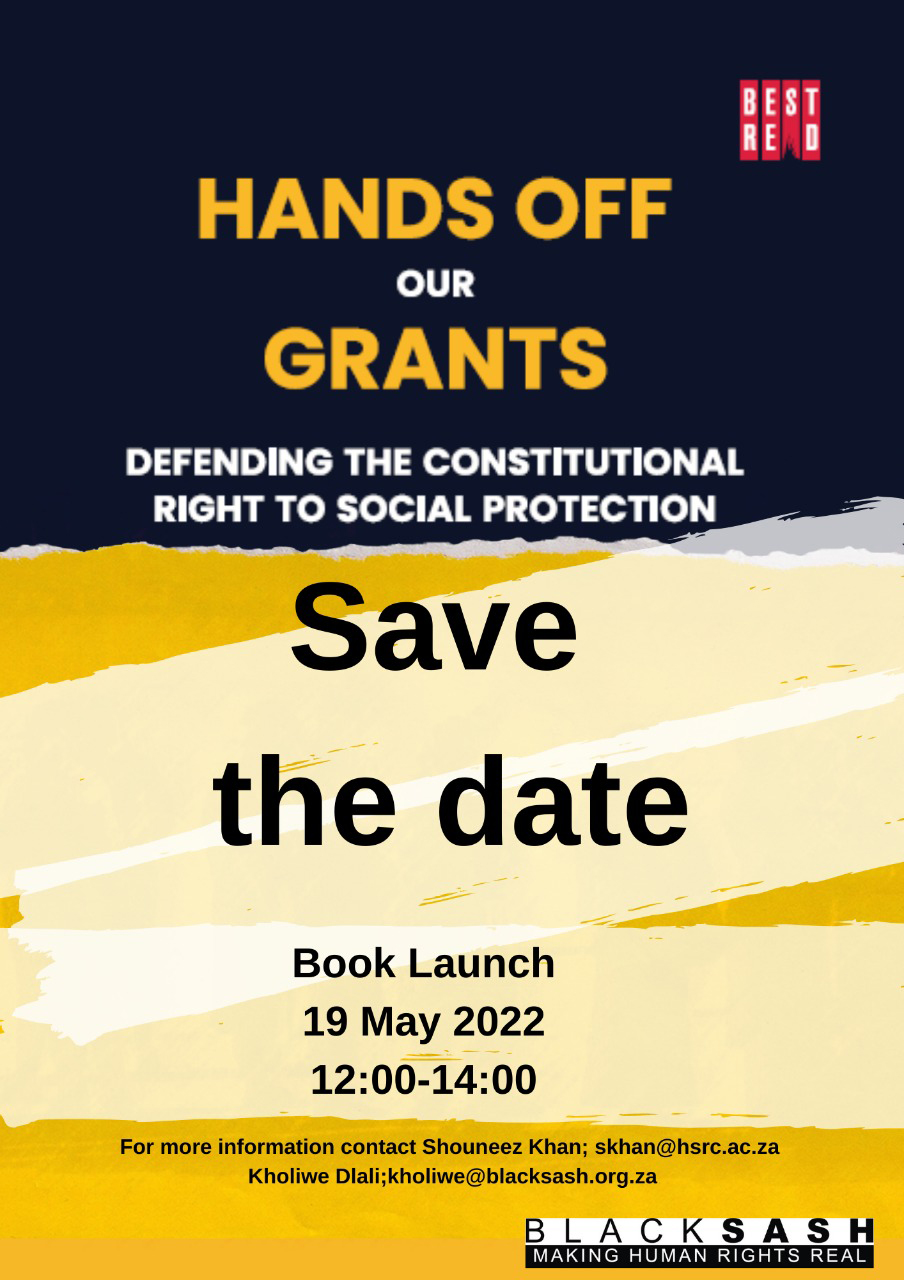
On Thursday at 12pm Black Sash will launching the book, Hands Off Our Grants: Defending the constitutional right to social assistance, which focuses on the State Capture era and how the Black Sash’s Hands Off Our Grants (Hoog) campaign – supported by civil society organisations – mobilised behind beneficiaries to reclaim their constitutional rights to social security.
It is described as “a story of grit, dedication and collective victory in achieving social justice for those affected by irregular, fraudulent and allegedly unlawful deductions from social grants”.
Register here.
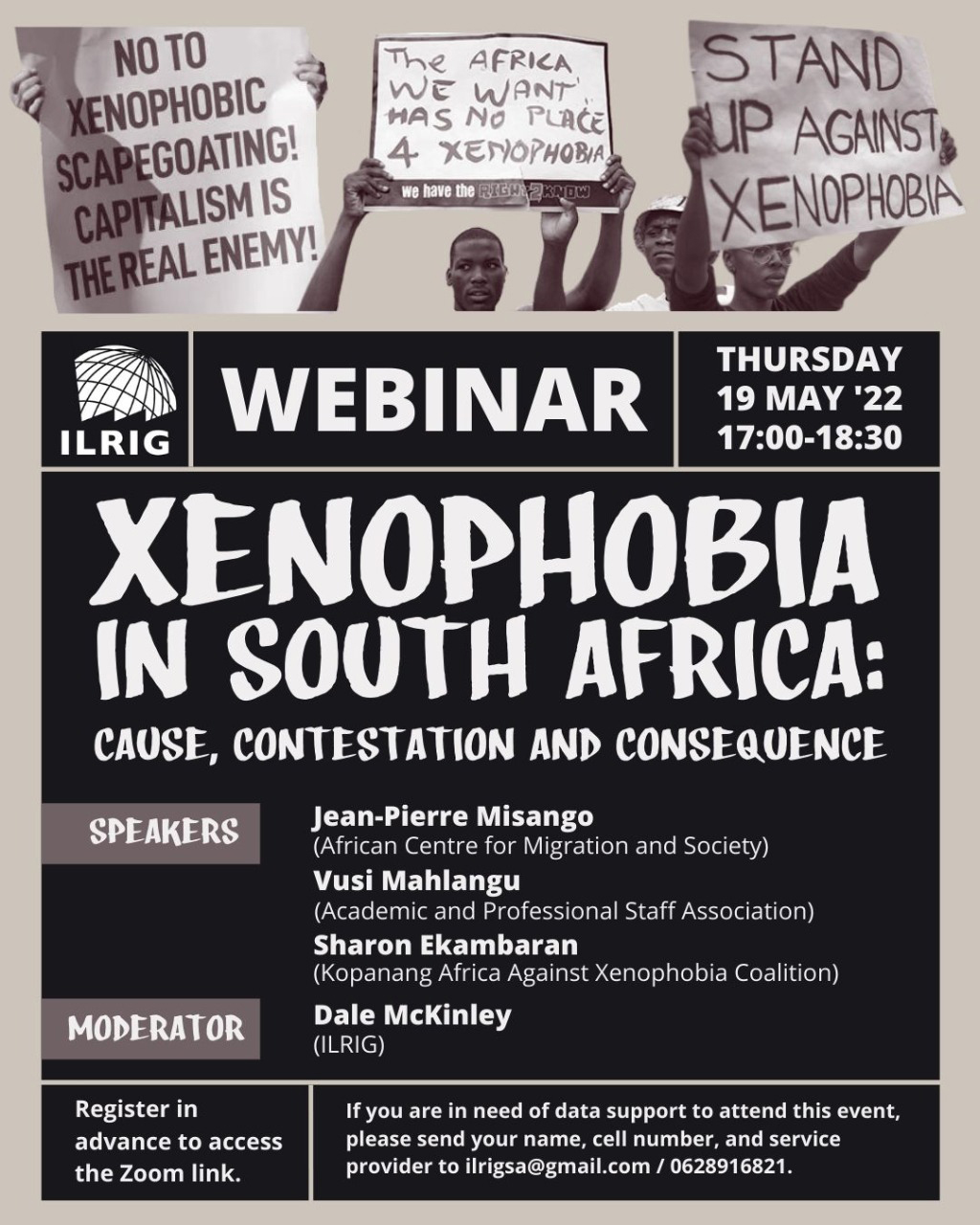
At 5pm on Thursday, the International Labour Research and Information Group (Ilrig) will host a webinar on “Xenophobia in South Africa: Cause, Contestation and Consequence”.
The moderator is Dale McKinley of Ilrig. Speakers include Jean-Pierre Misango of the African Centre for Migration and Society; Vusi Mahlangu of the Academic and Professional Staff Association; and Sharon Ekambaram of Kopanang Africa Against Xenophobia.
Those in need of data support to attend the event can send their name, cell number and service provider to [email protected] or 062 891 6821.
Register here.
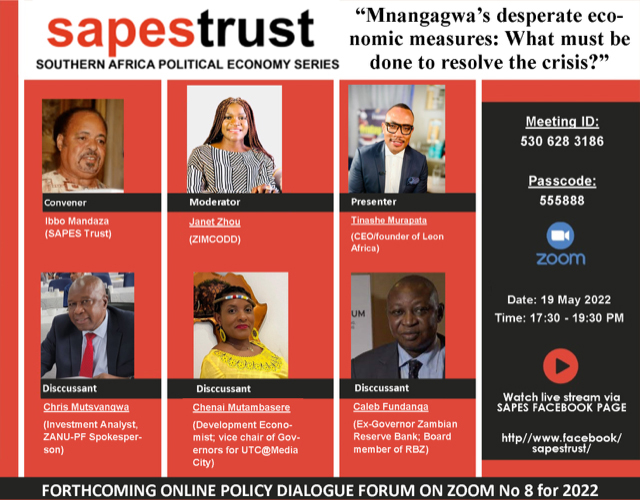
On Thursday at 5.30pm the Southern Africa Political Economy Series (Sapes) Policy Dialogue will explore “Mnangagwa’s desperate economic measures: What must be done to resolve the crisis?”
This comes after the dialogue on 5 May explored the state of the Zimbabwean economy, particularly the fiscal crisis.
“Events have now provided a solution in the form of a Presidential decree on 7 May 2022, ‘Measures to Restore Confidence, Preserve Value and Restore Macroeconomic Stability’. The statement was endorsed by the Reserve Bank of Zimbabwe but has drawn almost universal condemnation from economists and business. Most are concerned that the proposed measures will worsen the situation rather than improve it,” according to the event description.
An expert panel will examine the new measures that the government needs to take. Speakers include Chris Mutsvangwa, an investment analyst and Zanu-PF spokesperson; Chenai Mutambasere, a lead business analyst and change consultant; and Caleb Fundanga, former governor of the Bank of Zambia.
Join the Zoom meeting here. The meeting ID is 530 628 3186 and the passcode is 555888.
A livestream of the event can also be found on the SAPES Trust Facebook page.
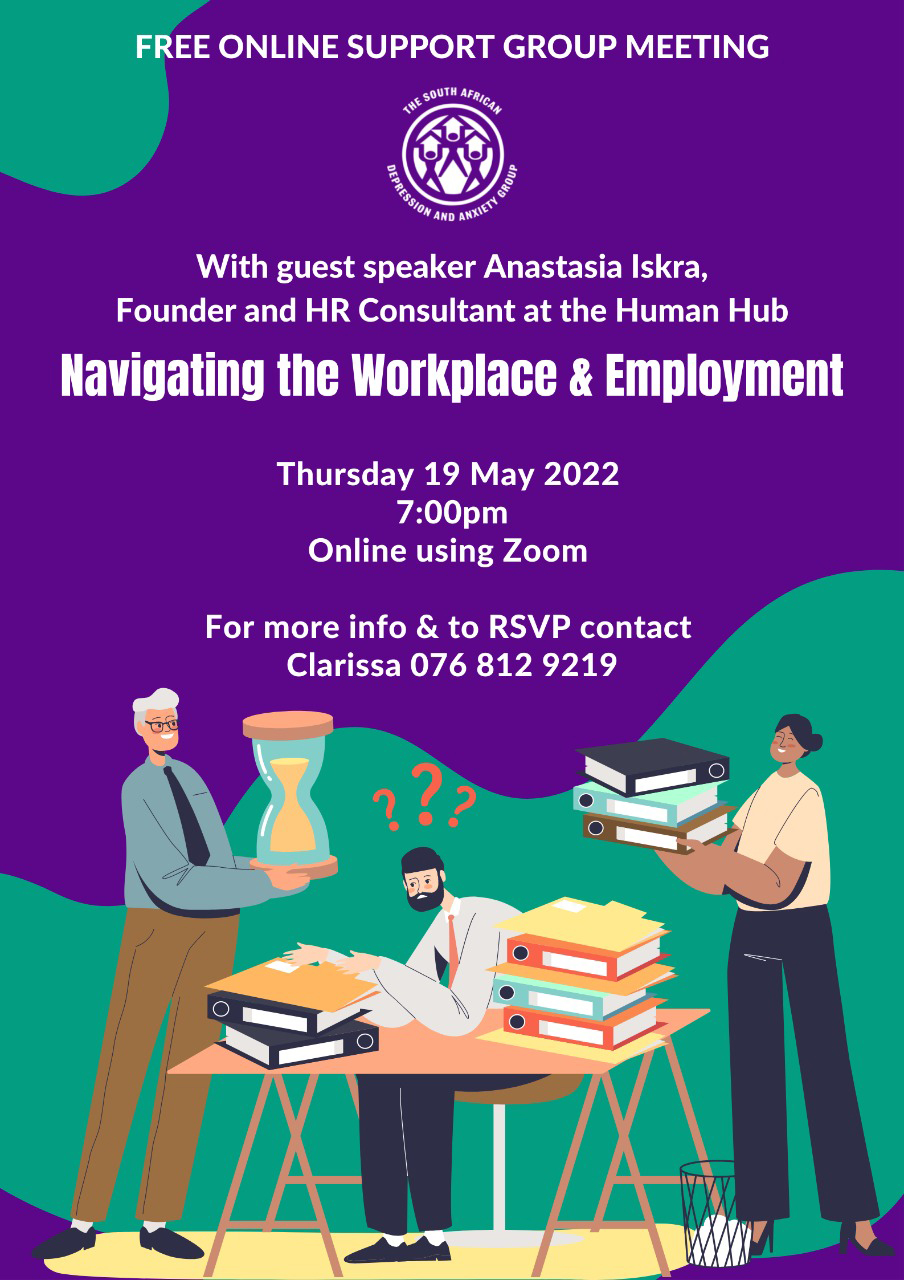
Poster 10
On Thursday at 7pm Sadag will host a free online support group meeting on “Navigating the workplace and employment”. The guest speaker is Anastasia Iskra, founder and HR consultant at the Human Hub.
For more information contact Clarissa on 076 812 9219.
Friday, 2o May is World Bee Day, which aims to raise awareness of the importance of pollinators, the threats they face and their contribution to sustainable development, according to the UN.
Bees and other pollinators are increasingly under threat from human activities. However, pollination remains a fundamental process for the survival of our ecosystems.
“Nearly 90% of the world’s wild flowering plant species depend, entirely, or at least in part, on animal pollination, along with more than 75% of the world’s food crops and 35% of global agricultural land,” according to the UN. “Not only do pollinators contribute directly to food security, but they are key to conserving biodiversity.”
The goal of the day is to strengthen measures aimed at protecting bees and other pollinators. This would contribute significantly to solving problems related to global food supply and hunger in developing countries.
Also on Friday, the Supreme Court of Appeal will hear an appeal brought by Minister of Social Development Lindiwe Zulu and the MECs of social development in all provinces except the Western Cape. They are appealing against a judgment by the North Gauteng High Court forcing them to pay subsidies owed to preschool children in the SA Childcare case of October 2020.
This comes after the minister and MECs withheld the payment of early childhood development grant subsidies while early childhood development centres were forced to remain closed during the Covid-19 pandemic. DM/MC
[hearken id=”daily-maverick/9472″]




















 Become an Insider
Become an Insider
Comments - Please login in order to comment.